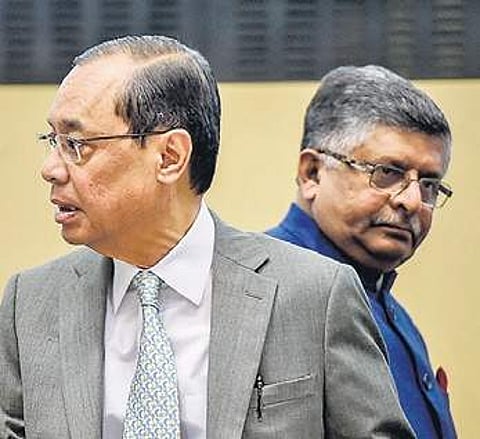

NEW DELHI: Union Law Minister Ravi Shankar Prasad on Monday said Constitutional morality must be defined with clarity and that it cannot change from judge to judge. Speaking at a function organised by the Supreme Court to celebrate Constitution Day, Prasad said, “We hear about Constitutional morality, we appreciate innovations but nuances of Constitutional morality should be outlined with clarity and should not differ from judge to judge and there must be a consensus.”
Echoing the similar sentiments, legal luminary Fali S Nariman said, “The issue of Sabarimala has become a very difficult problem. Ultimately, it is social structures which decide how far we are able to move and at what pace. Not mere law.”
Stressing the importance of collegiality amongst judges, he said it is lacking in India. “The difficulty is when Supreme Court judges sit in Benches of three, five and seven. But they don’t sit and discuss as to what is to happen. Or that ‘you write for the majority and you write for the minority’. While that happens everywhere in the world, it does not happen here. They (Supreme Court judges) all come on the same day and pronounce the judgment. Nobody knows which judge has dissented (until then),” Nariman said while urging that Supreme Court judges address this problem.
Renowned legal educationist Prof Dr N R Madhava Menon cited the example of Germany where legislature and executive get enough time to implement court orders so that no unrest arises even in sensitive cases.
Had the judges given enough time to the government to find ways to implement the Sabarimala order, what is happening in Kerala could have been avoided, Menon observed.
Chief Justice of India Ranjan Gogoi said the Constitution is not a document frozen in time and today is not an occasion to celebrate but to test constitutional promises.
Prasad also said stressed governance is executive’s domain, adding the judiciary has to decide “how far” it needs to go.